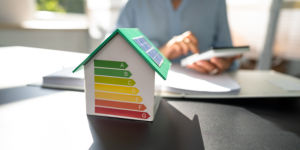Energy saving tips to reduce electricity bills

Whether you are an individual living alone, in a shared arrangement or a family, we all are conscious of our energy usage both from a cost and environmental perspective. It’s important to stay warm, but any reduction in energy usage is good news too, so this article will look at ways to save electricity.
In this article we will look at:
- How to reduce electricity usage at home.
- How to minimise electricity waste.
- How to save money on energy bills.
- Practical ways to use less electricity.
- Supports and grants available to make your home more energy efficient.
Tips to reduce your electricity bills during winter
Monitor your electricity usage
If you know how much electricity you are using in your home and what appliances are using the most electricity, then you can see where you can cut back on usage and where savings can be made.
A really easy way to monitor your electricity usage is to install an ESB Networks smart meter. A smart meter will track how much electricity you are using and will show you which appliances in your home are using the most power. This information will help you see how much electricity you are using and where you could reduce your usage.
If you have solar panels in your home, a smart meter will also allow you to receive payment for any excess electricity you generate that can be sold back on to the grid.
Assess your current usage
You can get a better understanding of your current electricity usage by reviewing your bills and habits. If you look back at your bills, do you notice any trends such as more expensive bills at certain times of the year or increased usage that leads to more usage from using certain appliances?
During winter we generally use more electricity for heating, lighting, washing and drying clothes. Perhaps you could use appliances such as your washing machine during off peak times when electricity is cheaper. Off peak times when electricity is at its cheapest is from 11pm to 8am, so if you can use your washing machine then it might result in savings.
If you notice that you have been using an appliance such as a clothes dryer or dishwasher more frequently, and this is reflected in an increase in your electricity bill, try limit its use and see does that make a difference to your next bill.
You could also check out these energy saving tips and see what appliances in your home are costing the most.
Set energy reduction goals
Once you have worked out your electricity usage the next step is to look at setting realistic energy-saving goals.
Are there appliances in your home that you could manage without, and which require a large amount of energy usage?
Some simple solutions include:
- Switch off devices in standby.
- Turn off lights when not needed.
- Replace old lightbulbs with energy efficient LED bulbs.
- Use a draught seal which is an easy and cheap way of sealing your windows.
- Draught excluders will also limit draught coming in from underneath doors.
- Wash clothes at 30 degrees and during off peak times if possible.
- Use an air fryer instead of a conventional oven.
- Use a chimney balloon in your fireplace when it's not in use. You can buy these in most hardware shops.
- When buying new appliances such as refrigerators and washing machines, try to buy the most energy efficient options. The more energy efficient the cheaper it will be to run.
- Get your boiler serviced regularly to ensure it runs efficiently.
- Use a timer for your heater and your lights so that the heating and lights only come on and stay on for a specified time.
- You can set your thermostat a degree or two lower to reduce your energy consumption.
Energy efficiency upgrades
The better insulated your home is, the more likely it will have a higher BER rating. Although insulating your home can be costly, you could save money in the long run by reducing your heating bills.
The Sustainable Energy Authority of Ireland (SEAI) provide various insulation grants including grants for attic; internal and external walls; and cavity wall insulation.
If you have old windows and doors that aren’t glazed well, you could find your home has lots of draughts. To limit the amount of warm air escaping, you could use a draught seal which is an easy and cheap way of sealing your windows. Our home sustainability blog provides lots of handy tips on making your home more energy efficient.
You could look at improving your BER rating. Homes with a higher BER rating are able to maintain a comfortable temperature while using less energy than homes with lower ratings, so it makes sense to try and improve your BER rating for better energy efficiency.
Our BER rating guide explains everything you need to know about BER ratings, the grants that are available for home energy upgrades and how a high BER rating can bring down the cost of your home insurance.
Have you ever considered switching to green energy? Having solar panels fitted to your home can be expensive but could save you money in the long run. The SEAI provide grants for people who want to use renewable energy, such as the solar electricity grant and the solar water heating grant.
Change your habits
Small actions can have a great impact when it comes to reducing your energy consumption. When it comes to reducing electricity usage and incorporating more ethical and sustainable practices, we can all make a difference. Simple changes in our attitude and thinking can go a long way to ensuring our homes are warm, sustainable and eco-friendly.
About: How do you better protect your world?
Related articles
Filter by category
Follow us on
 Sending Response, please wait ...
Sending Response, please wait ...
Your response has been successfully submitted.
An error has occurred attempting to submit your response. Please try again.




